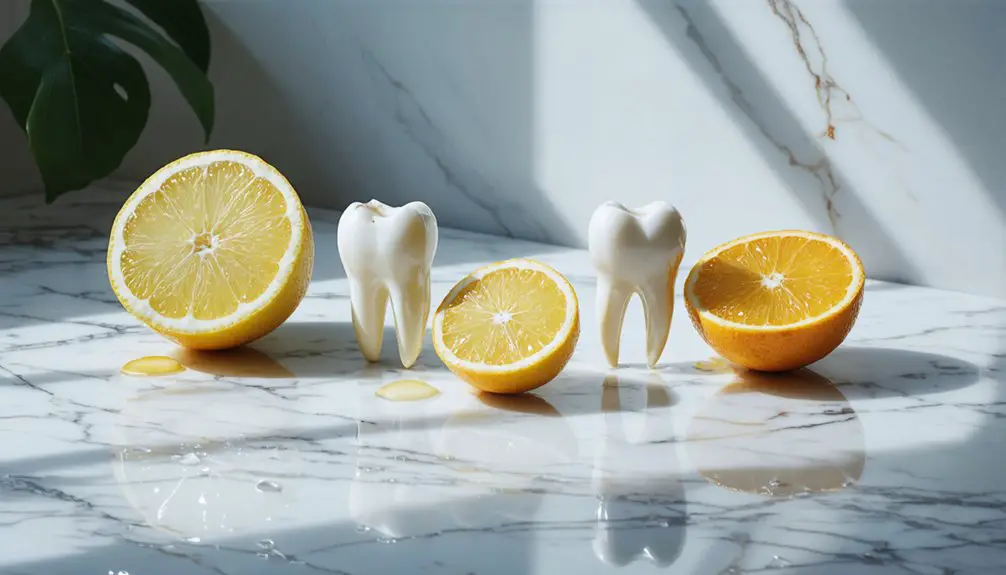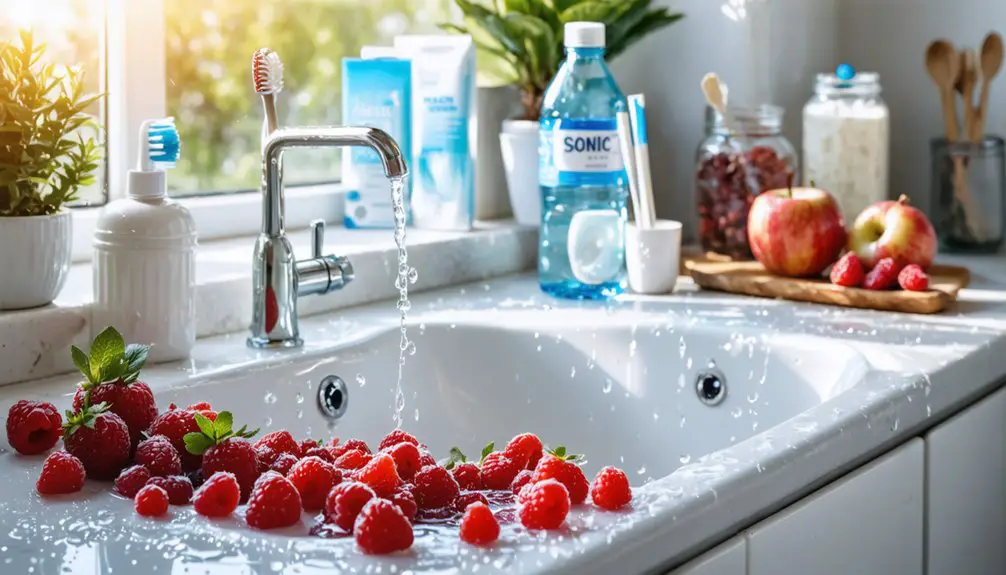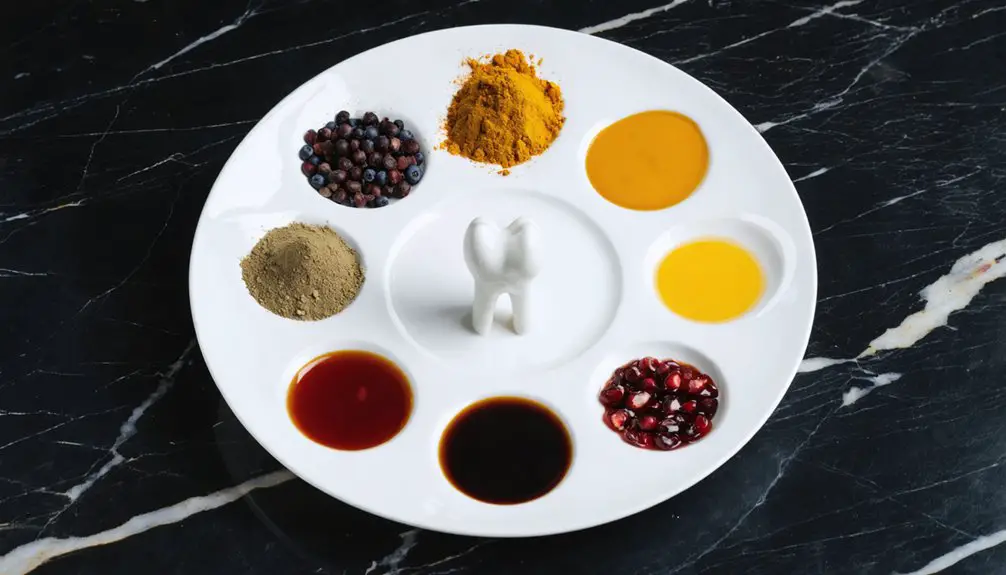To protect your teeth from citrus-induced staining, you’ll need a thorough approach combining prevention and treatment. Rinse your mouth immediately after consuming acidic fruits, wait 30 minutes before brushing, and use a straw when drinking citrus beverages. Maintain proper oral hygiene with fluoride toothpaste and regular flossing, while incorporating natural whitening methods like coconut oil pulling and calcium-rich foods. Professional dental guidance can provide additional strategies for maintaining your bright, healthy smile.
Key Takeaways
- Rinse mouth immediately with water after consuming citrus fruits to neutralize acids and prevent staining compounds from settling.
- Use a straw when drinking citrus beverages to minimize direct contact with teeth surfaces.
- Wait 30 minutes after citrus consumption before brushing to protect enamel and prevent stain absorption.
- Incorporate whitening toothpaste with mild abrasives and peroxide for daily maintenance against citrus stains.
- Chew sugar-free gum after citrus fruits to increase saliva production and naturally cleanse teeth surfaces.
Understanding How Citrus Fruits Impact Your Teeth
While citrus fruits offer valuable nutritional benefits, their highly acidic nature poses significant risks to your dental health. When you consume citrus fruits, their primary component, citric acid, combined with ascorbic and malic acids, creates an environment with pH levels between 2-3, dramatically more acidic than neutral water.
These citrus acids initiate a process of enamel erosion by demineralizing your tooth’s protective outer layer. Your enamel, though the hardest tissue in your body, remains vulnerable to this acid attack. Regular dental checkups and proactive dental care can help identify early signs of enamel erosion. Repeated exposure to acidic foods can cause your teeth to develop rounded edges, indicating gradual wear over time.
The sustained exposure to these acids can weaken and dissolve the enamel irreversibly, potentially exposing the sensitive dentin beneath. This damage often manifests as increased tooth sensitivity and susceptibility to decay, particularly when combined with the sugar content that feeds harmful oral bacteria.
Best Practices for Consuming Acidic Foods
Understanding the risks of acidic foods doesn’t mean you need to eliminate them from your diet – instead, implementing specific protective measures can safeguard your dental health.
Smart dental care isn’t about avoiding acidic foods entirely – it’s about knowing how to protect your teeth while enjoying them.
When consuming acidic foods, immediately rinse your mouth with water to neutralize pH levels and protect your enamel. Don’t brush for at least 30 minutes afterward, as acids temporarily soften your enamel, making it vulnerable to abrasion. Sticky sugary foods require prompt brushing to prevent cavity formation.
For additional enamel protection, use a straw when drinking acidic beverages to minimize contact with your teeth. Regular exposure to acidic substances without proper breaks can cause gradual enamel erosion.
After meals, chew sugar-free gum to stimulate saliva production, which naturally neutralizes acids.
Maintain ideal dental health by consuming foods rich in calcium and phosphorus, such as dairy products and leafy greens, to strengthen your enamel and support natural remineralization processes.
Natural Methods to Combat Citrus Staining
Despite citrus fruits’ vibrant flavor and nutritional benefits, their acidic nature can lead to stubborn tooth staining. To combat this, you’ll find several natural remedies effective in maintaining your dental aesthetics. Incorporate strawberry and baking soda paste applications for gentle whitening, but limit exposure to five minutes. Coconut oil pulling performed daily helps remove deep stains while promoting overall oral health.
Complement your routine with fiber-rich vegetables like broccoli and cauliflower, which naturally scrub teeth while stimulating protective saliva production. Malic acid in apples naturally brightens teeth while providing gentle cleaning action.
You can neutralize fruit acids by increasing water consumption throughout the day, particularly after consuming citrus. Consider chewing sesame seeds or raw nuts for their mechanical cleaning action.
When implementing these methods, remember that moderation is essential – excessive use of acidic solutions, even natural ones, may compromise your enamel. Always maintain regular dental hygiene alongside these natural approaches for best results.
Daily Oral Care Strategies for Whiter Teeth
To maintain ideal dental whiteness, implementing proper daily oral care routines proves essential for combating stains and preserving enamel integrity.
Your daily brushing routine should include using a soft-bristled toothbrush for at least two minutes, twice daily, ensuring thorough coverage of all tooth surfaces. Incorporate regular flossing habits to remove plaque and debris between teeth where stains commonly develop. Using a straw while drinking beverages like coffee, tea, and wine can help minimize contact with teeth and reduce staining. Adding crunchy fruits and vegetables to your diet naturally scrubs away surface stains while eating.
Supplement your routine with an antiseptic mouthwash containing fluoride to strengthen enamel and reduce bacteria-causing discoloration. Replace your toothbrush every three months to maintain peak cleaning effectiveness.
When selecting whitening toothpaste, choose formulations with balanced mild abrasives and peroxide components. Avoid brushing immediately after consuming acidic foods; instead, rinse with water to neutralize acids and protect your enamel from erosion.
Professional Treatments and Long-Term Solutions
When pursuing professional teeth whitening treatments, maintaining ideal results requires careful attention to post-treatment protocols and dietary modifications. Your enamel becomes temporarily porous and sensitive, making professional monitoring essential to guide your post-treatment care. Professional treatments offer more effective results than at-home whitening options.
To protect your investment, you’ll need to avoid acidic citrus fruits and pigmented foods for at least 48 hours after treatment. Your dentist can recommend appropriate whitening products and create a customized maintenance plan that balances your cosmetic goals with enamel health. The acidic nature of citrus fruits like lemons can cause blackish stains to develop.
Protect your whitening results by avoiding staining foods and working with your dentist to develop an enamel-safe maintenance routine.
Regular dental checkups allow early detection of potential issues while enabling timely touch-up treatments.
Consider adopting long-term strategies like using straws for colored beverages, maintaining good oral hydration, and applying remineralizing agents to strengthen your enamel and prevent future staining.
Frequently Asked Questions
Can Citrus-Induced Tooth Stains Be Permanent if Left Untreated?
Over 80% of citrus-induced stains start as temporary, but if you don’t treat them, ongoing citrus acidity can trigger permanent enamel erosion, exposing darker dentin underneath your tooth’s surface.
Do Different Citrus Fruits Cause Varying Levels of Tooth Staining?
Yes, but not directly. Higher citrus acidity in lemons and limes erodes your tooth enamel more severely than oranges, making teeth more susceptible to staining from other foods and beverages.
How Long Should I Wait Between Consuming Multiple Citrus Fruits?
While you might be tempted to enjoy citrus fruits back-to-back, you’ll need to wait 30-60 minutes between each serving to protect your enamel from prolonged fruit acidity impact and allow proper remineralization.
Are Citrus-Based Supplements and Vitamins Equally Damaging to Tooth Enamel?
You’ll find chewable and fizzy vitamin C supplements can be more damaging to your enamel health than citrus fruits, as their concentrated acids have prolonged contact with teeth during regular supplement use.
Can Wearing Night Guards Help Protect Against Citrus-Related Staining During Sleep?
Your night guard’s effectiveness in sleep dental care can help protect against citrus stains by creating a physical barrier, but you’ll need consistent wear and proper cleaning for ideal protection.
References
- https://spencerdds.com/blog/berries-what-to-know-about-tooth-staining/
- https://bluetoothdental.com.au/blog/teeth-staining/
- https://www.jamaicaplaindental.com/how-to-prevent-food-stains-on-teeth/
- https://www.azfd.com/blog/top-foods-whiten-teeth-prevent-staining/
- https://lowrymainstreetdental.com/keep-favorite-drinks-staining-teeth/
- https://www.tylerfamilydental.com/2024/09/23/citrus-fruits-on-tooth-enamel/
- https://www.williamsburgdds.com/blog-articles-dental-tips/can-too-much-citrus-be-a-bad-thing
- https://pmc.ncbi.nlm.nih.gov/articles/PMC7433862/
- https://capitolpremierdentalgroup.com/6-snacks-that-are-bad-for-teeth/
- https://pubmed.ncbi.nlm.nih.gov/267657/



